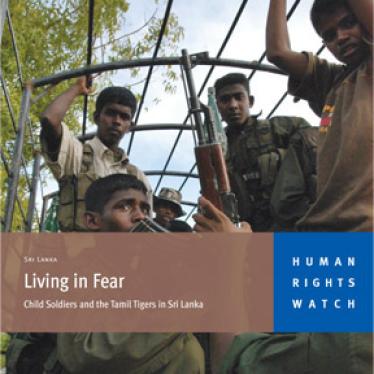(New York) - The killings of a senior Tamil Tiger official and a former parliamentarian underscore the need for all sides to address human rights concerns in the Sri Lankan peace process, Human Rights Watch said today.
On February 8, E. Kaushalyan, the political head of the rebel Liberation Tigers of Tamil Eelam (LTTE) in the eastern Batticaloa-Amparai region, was killed in an ambush in a government-controlled area while returning from discussions in Kilinochchi on post-tsunami relief and recovery work. Five members of his convoy were also killed, including Chandranehru Ariayanayagam, a former parliamentarian and a member of the LTTE human rights body, the North East Secretariat on Human Rights (NESOHR).
While the perpetrators of the killings are not yet known, it is widely believed that they were carried out by forces loyal to Colonel Karuna, who broke away from the LTTE in March. Some in the LTTE have accused government forces of complicity, though no evidence has been offered.
“These killings are particularly disturbing as they may signify a dangerous new round of politically motivated violence,” said Brad Adams, Asia director of Human Rights Watch. “This kind of violence and intimidation undermines the ceasefire and hinders the post-tsunami relief and rehabilitation work going on right now.”
Political killings have continued in Sri Lanka despite the ceasefire between the government and LTTE that has been in effect since 2002. Frequent political murders and violent clashes between LTTE members and persons loyal to Karuna pose a grave threat to civilian security in eastern Sri Lanka. The LTTE has long carried out politically motivated killings in order to strengthen its hold over the north and east of Sri Lanka, and has used violence and intimidation against perceived opponents to its claim that it is the sole representative of the Tamil people in Sri Lanka.
The February 8 killings may have been a violation of the ceasefire agreement and should be investigated by the Norwegian-led Sri Lanka Monitoring Mission (SLMM), put in place to monitor the ceasefire. The monitoring mission has publicly stated that these killings do not fall within its remit.
“The Sri Lanka Monitoring Mission should urgently investigate these killings and strengthen its human rights monitoring capability,” said Adams. “Failure to do so would affect its credibility and engender mistrust from the very population it is meant to protect.”
In a welcome if unusual move, the Sri Lankan government has condemned the killing of LTTE leader Kaushalyan. Human Rights Watch said that the government must do more than simply condemn the killing. In light of a possible complicity by government forces, the government should immediately establish a commission of inquiry into the deaths and ensure that proceedings and conclusions are credible and transparent.
Human Rights Watch stated that while LTTE officials were the victims in this case, the Tamil Tigers have also been carrying out politically motivated killings with impunity. Since November there have been numerous murders and attempted murders of LTTE members, as well as assassinations and abductions of the rebel group’s opponents and critics.
“For the ceasefire to work, all involved parties, including the international community, must take stronger steps to ensure that human rights protection is a major part of the process,” said Adams.







